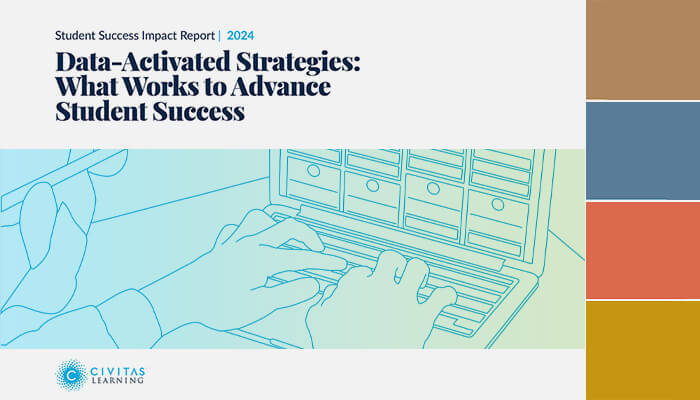
5 Ways to Eliminate Barriers to Course Enrollment
Share this Post
Today’s college students are vastly different from students in years past. While student populations vary from institution to institution, today’s students are often older, and more racially, ethnically, and socioeconomically diverse. They are navigating more complex individual circumstances alongside their education than previous generations.
This wide range of needs can make navigating course registration processes challenging. Factors like disjointed systems requiring multiple logins, unclear information on required courses, and support services that are difficult to access can all create barriers. These obstacles can severely hinder students’ ability to stay on track and graduate on time, with nearly 1 in 5 students who do not graduate having completed 75 percent or more of the credit threshold.
However, by breaking down these barriers and streamlining course enrollment to encompass the entire academic journey, institutions can better support their students and improve retention and completion rates.
5 Ways to Remove Barriers to Registration
1. Prioritize Engagement with Real-Time Visibility into Student Needs
Without the right insights, institutions across the Civitas Learning community report that their advisors often spend less than 30% of their time helping students in greatest need. The students who are raising their hands are not necessarily the ones in need of immediate support. The Civitas Learning Student Impact Platform combines academic, behavioral, engagement, and financial student data to provide a complete picture of each student’s journey. This enables advisors to prioritize and engage with the students who are truly at risk, ensuring that support reaches those who need it the most.
This data surfaces in the form of persistence predictions, grouping students into buckets (very low, low, moderate, high, and very high) so advisors can prioritize engagement by monitoring each student’s likelihood of persistence over time. Real-time visibility into student needs enables advisors to help students who may not otherwise ask for help and identify what might stand in the way of their coursework.
Descriptive, diagnostic, predictive, and prescriptive analytics within the Student Impact Platform give advisors and administrators insights into how to prioritize student engagement and the case management capabilities to execute their data-informed strategies at scale. Advisors can also quickly identify students who haven’t registered yet using filtering functionality to prioritize outreach, address any barriers to registration, and get students back on track.
2. Boost Student Appointment Attendance with Varied Meeting Modalities
Traditional and non-traditional college students balance many responsibilities outside the classroom while completing their education. Busy schedules and competing commitments can make finding a time to meet or attend a meeting with an advisor difficult. Institutions can help their students balance life and learning by making it easy to access the guidance and support they need to succeed.
Civitas Learning’s Advising Analytics and Workflow solution makes it easy to facilitate student meetings using a calendar integration that allows advisors to manage events, appointments, notifications, and reminders in one place. The Student Impact Platform also enables advisors to offer a variety of appointment modalities to meet their students’ preferences. It helps students follow through on scheduled meetings with built-in notification and reminder functionality to help nudge busy students to attend important meetings with their advisors.
3. Targeted Student Outreach and Preferred Modalities
Rather than sending mass messages to an assigned caseload, institutions can use data to help determine who needs support and the best way to communicate with them. They can go a step further by filtering for each student’s most effective communication method, whether it’s a phone call, email, or text message.
For example, advisors can use insights from the Student Impact Platform to segment students, sending nudges to those with a high likelihood of persistence while planning phone calls for students who need more direct outreach. This data-driven, student-centered communication approach improves response rates and allows advisors to personalize engagement at scale.
The Civitas Learning Platform enables students to set their communication preferences, and advisors and administrators can implement multi-channel outreach strategies to determine which methods are most effective for different groups. Student success teams can also focus on specific groups, such as first-generation incoming students, and tailor their communication and resource recommendations to meet the unique needs of those audiences.
4. Ease Enrollment with End-to-End Planning, Scheduling, and Registration
To graduate on time, students need guidance and a clear plan to help them stay on track and enroll in the courses they need when they need them. A streamlined registration experience allows students to take ownership of their academic journey and dynamically explore degree requirement changes without infringing on their current plan.
Civitas Learning’s Academic Planning and Student Scheduling solution has notably enhanced advisors’ ability to see a complete picture of their students’ academic paths. Advisors and students can easily communicate about changes or questions about their plans within one platform. They can also view progress toward their degree, providing a clear pathway to graduation. Advisors and students can access a detailed history of completed courses to know what’s needed to complete their degree on time and within budget. Students and advisors receive plan alerts in real-time that proactively identify potential barriers such as:
- Duplicate courses
- Missing prerequisites and corequisites
- Courses that do not count toward degree requirements
- Courses not available for scheduling
When the course schedule is available, students use their plan and can automatically generate all potential schedules in the same experience, factoring in any scheduling constraints from outside commitments. From here, students can register directly from their planned schedule without moving to a different platform.
5. Build a Student-Centered Course Schedule
Most institutions build their course schedule by rolling over last year’s schedule and collecting faculty preferences. Unfortunately, student preferences, degree planning needs, and academic performance are rarely considered, leading to a “best guess” scheduling approach. This can negatively impact time to graduation and result in insufficient course availability.
From a student’s perspective, these scheduling silos are frustrating when it comes to finding the courses they need at the times they need them. For example, if the history and math departments don’t communicate, students may face macro-level scheduling conflicts, with both classes offering overlapping sections. This can lead to barriers such as students under-enrolling in course credits, taking unnecessary classes, and delaying graduation to future terms.
Civitas Learning’s Course Demand Analytics alleviates uncertainties and empowers your team with accurate, actionable insights. With centralized course data, real-time enrollment monitoring, and course demand forecasts, institutions can create more accurate course schedules. This helps avoid issues like insufficient course availability and over-provisioning, ultimately streamlining the student registration experience and improving overall resource utilization.
Create a More Inclusive Enrollment Experience
Today’s college students represent a diverse and multifaceted group, significantly different from previous generations. Disjointed systems, unclear course information, and limited access to support services create significant barriers, impacting students’ ability to graduate on time. However, by optimizing course enrollment across the entire academic journey, institutions can better support their students and enhance retention and completion rates.
Leveraging tools like Civitas Learning’s Student Impact Platform, institutions can prioritize personalized student engagement, improve appointment attendance, tailor outreach strategies, streamline academic planning and scheduling, and optimize course offerings based on accurate data insights, ensuring a smoother path to graduation for all students.



